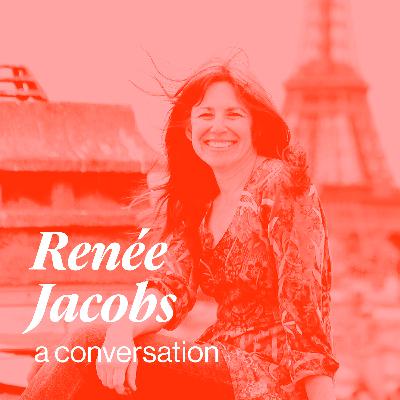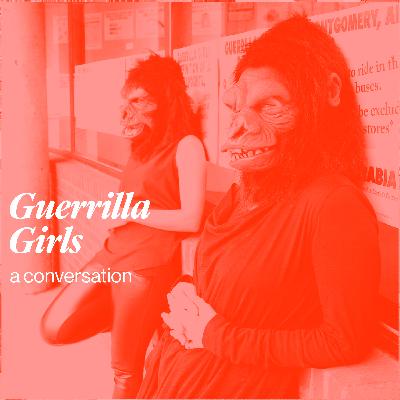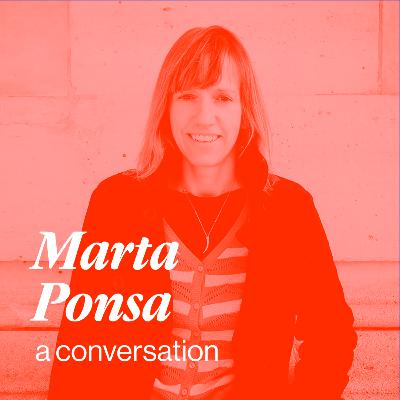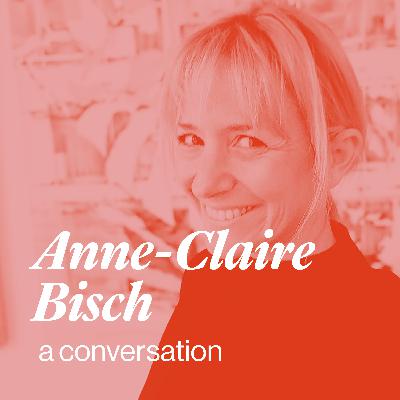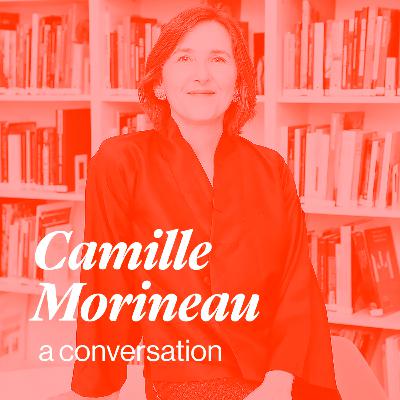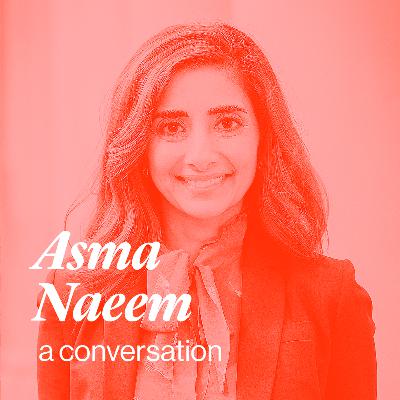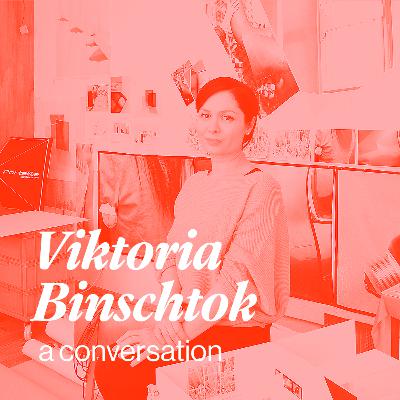Discover Raw and Radical Women in the Arts Podcast | Conversations with extraordinary women in the arts
Raw and Radical Women in the Arts Podcast | Conversations with extraordinary women in the arts

Raw and Radical Women in the Arts Podcast | Conversations with extraordinary women in the arts
Author: Mauren Brodbeck
Subscribed: 15Played: 118Subscribe
Share
© 347385
Description
Raw and Radical Women in the Arts is a series of conversations with outstanding women in the arts who are striving to live bold, authentic, creatively-fulfilling lives. In these interviews, they explore the themes of identity, vulnerability, authenticity, loneliness, alienation, discrimination, inspiration, empowerment, and social change.
TRUE STORIES AND INSPIRATION FROM CREATIVE WOMEN CHALLENGING SOCIETY'S STATUS QUO
Let's get real about living a life in the arts and the multi-faceted roles of being a creative woman.
For more information, visit us at www.rawradical.com
TRUE STORIES AND INSPIRATION FROM CREATIVE WOMEN CHALLENGING SOCIETY'S STATUS QUO
Let's get real about living a life in the arts and the multi-faceted roles of being a creative woman.
For more information, visit us at www.rawradical.com
43 Episodes
Reverse
Dana Hoey, a San Fransisco born artist and photographer based in upstate New York, talks about her photography and video work which investigates gender roles, archetypes, aggression, and power in society.
For the last episode of the season, we welcome Dana Hoey, an American artist that captures videos and photographs, and blends fact and fiction to question society’s preconceived ideas of gender, relations between each other, masculinity, and femininity. Avid in her practice of combat sports, she integrates that into her work as well and uses it in the directions she gives her models.
She also talks to us about her thoughts on being a woman in the arts as well as her philosophy on motherhood and how it impacted her career.
Conversation Highlights
The use of combat sports in her work
Exploring gender roles and identity
In for freedom and being a woman/mother in the art world
To read the story and learn more about Dana Hoey's work, please visit our website rawradical.com
Subscribe to our newsletter here.
Raw and Radical Women in the Arts Podcast is supported by Pro Helvetia the Swiss arts council, The Republic and Canton of Geneva, and the City of Lancy. We thank them for their support to women, culture, and the arts
---
Send in a voice message: https://podcasters.spotify.com/pod/show/rawradical/message
Lyz Parayzo, a Brazilian-born artist currently studying in the Beaux-Arts de Paris talks about her art, inspired by her personal experiences, and which focuses on the body, gender identity, and fluidity.
Lyz Parayzo, a Brazilian artist who works sculptures, live performances and audiovisual pieces, is with us on the show recorded from the gallery Espace L in Geneva, where there’s an exhibition called “PornoChic”. It was inspired by one of the tale of the book of the “Erotic Tales” by the Brazilian writer Hilda Hilst.
In this episode, we talk about the feminine performative, gender, its fluidity and its place in the art world that sometimes remains conservative. Through her work, like sharply cut sculptures representing ‘jewelry as self defense’, she aims to create the aforementioned debate, raising questions on desire and violence and its relation to the feminine performative.
She shares how her personal experiences have heavily influenced her art, along with external inspiration through writers, artists and thinkers such as Lygia Clark, Hilda Hilst, Hudinilson Junior, Kubra Khademi, Paul Preciado and Annie Sprinkle.
Her work is provocative, and affronting to some. Some of it has once been censored. But her art, as her body - which she draws from for her creations - takes a political stance, as the LGBT community still suffers from hate crimes, phobia and rejection.
Conversation Highlights:
Lyz’ “Guerilla Plans”: claiming art spaces for her art
Her series: “Bellic Prosthesis”, sculptures of ‘jewelries for self-defense’
Desire and violence, gender and identity
To learn more about Lyz and this episode, visit our website rawradical.com
This podcast is supported by Pro Helvetia The swiss arts council, The Republic and Canton of Geneva, and the City of Lancy in Switzerland. We thank them for their support to culture, women and the arts.
---
Send in a voice message: https://podcasters.spotify.com/pod/show/rawradical/message
Calling herself a ‘visual narrator’, ‘intimate outsider’, and ‘subjective documentarist’, Mimiko Türkkan comes on the show to talk about her visual video project on water, in relation to fear, her creative process and social identity.
Our unique guest in this episode is Turkish artist Mimiko Türkkan. She creates artwork such as photography series, books and videos with a focus on gender roles and socially constructed identities.
She shares with us her artistic process in coming up with ideas, forming a narrative and going through a project. We focus particularly on her most recent creative endeavour, resulting in “Energy Watery Incantations” in the Galerie Analix Forever in Geneva, to which we get to listen to an excerpt.
She investigates her fears, in relation to ‘the flow’, her creative process and her relation to the world. With traveling and physical activity playing a major role in her artistic process, she gives us a glimpse into the making of “Energy Watery Incantations.” She also gives her piece about being a woman in the arts and gender equality in Turkey.
We also welcome Barbara Polla, owner of the Galerie Analix Forever, adding to the subject of the show ‘Water Paintings’, having had the opportunity to follow Mimiko throughout her creation.
Conversation Highlights:
Mimiko’s artistic process where traveling and physical activity have an important place
“Energy Watery Incantations”, her relation with fear and the flow.
Her thoughts on female identity, gender equality, and being a woman in the arts in Turkey
To listen to read the story and learn more about Mimiko, please go to our website www.rawradical.com
This podcast is supported by Pro Helvetia the Swiss arts council, The Republic and Canton of Geneva, and the city of Lancy, Switzerland. We thank them for their support to culture, women, and the arts.
---
Send in a voice message: https://podcasters.spotify.com/pod/show/rawradical/message
Spanish curator, art historian, writer and currently the director of the Art Gender Nature Institute at the FHNW Academy of Art and Design in Basel, Chus Martinez talks about reimagining the exhibition public space, the transformative role of art in society and being a woman in her field of work.
It’s a pleasure to welcome Chus Martinez to the show and to listen to her enriching thoughts, opinions, and experiences as a woman in the very pit of the artworld. She talks about how she reimagines and innovates the exhibition space as a curator, art’s powerful impact in driving social change, and being a woman in the art world.
We also discuss the mindset of artists working collaboratively versus this false idea of “the genius”, the experience of being immersed in the art education world, and the gradual coming back of man into cohabitation with nature.
Conversation Highlights:
Reimagining how to organize exhibitions
The impact of art on society
The gradual reconnection of man with nature
Chus’s experience being in the world of art education
Being a woman, and also a mother in the art world
For more information on our guest, read the show notes or the transcript, know more about our podcast, or subscribe to our newsletter, please go to our website www.rawradical.com
This podcast is made with the support of prohelvetia the Swiss Arts Council, The Republic and Canton of Geneva and the City of Lancy, Switzerland. We thank them for their support for culture, women, and the arts.
---
Send in a voice message: https://podcasters.spotify.com/pod/show/rawradical/message
Photojournalist, and then litigator turned one of the most celebrated photographers of the female nude of our time, Renée Jacobs talks about her career transformation, the visual representation of women in society and being a queer woman in her field of work.
I’m happy to receive Renée Jacobs on today’s episode. She explains her career choices and transitions, details on her “PARIS” and “POLAROIDS” book, insights and anecdotes on the pressure of being a woman, especially queer, photographer of the female nude.
We also highlight the importance of authenticity in the depiction of female sensuality, and of accurately shaping our own image (as women). In her words, “women can’t be heard if we can’t be seen.”
Conversation Highlights:
Her transition from photojournalism to law to photography of the female nude
The visual representation of women in our society, particularly of the erotic woman
Her books “PARIS” and “POLAROIDS”, and the “PHOTOS DE FEMME” organization
For more information on our guest, read the show notes, see the transcript, know more about our podcast, or subscribe to our newsletter, please go to our website www.rawradical.com
This podcast is made with the support of prohelvetia the Swiss Arts Council, The Republic and Canton of Geneva and the City of Lancy, Switzerland. We thank them for their support for culture, women, and the arts.
---
Send in a voice message: https://podcasters.spotify.com/pod/show/rawradical/message
Radical feminist artist, video artist, and Italian-Swiss performer Angela Mazullo talks about artistic alter egos, motherhood, and third wave feminism
Today I’m delighted to welcome Angela Mazulla to the show to talk about her artistic alter ego, how she has combined motherhood and art, and a unique oral history project she has nurtured over the past several years titled, “The Archives of Radical Feminism.”
Today’s podcast is unique in that it was originally conducted in French, and the interview is overlaid with an English translation.
Key points of the conversation:
Her artistic alter ego
Being a mother and an artist
The Archives of Radical Feminism
Her artistic alter ego
Angela was born to an Italian father and a Swiss mother and grew up in a small village near Zurich, where there was a great deal of liberal thought and conversations about progressive political movements. This shaped a great deal of her early thinking and influenced the direction of her artistic exploration later.
After she moved to Geneva for art school, she created an alter ego for her art performances named “Makita.” She says this allowed her to have more freedom to experiment with more sensitive and provocative subjects in her performances than if she’d performed under her own legal name.
Angela says that “Makita” is a role that she plays that lends more power and depth to her performances, but because it is an alter ego, she doesn’t have to inhabit that role all the time, which makes it possible for her to be more courageous and provocative in her performances.
Being a mother and an artist
Angela says that she always wanted to be a mother, but unlike many women, deliberately chose to get pregnant with her children while she was also in school. At the time, this was a radical, defiant act because many women either hid their pregnancies or dropped out of school.
However, not only did she have two daughters, she also found ways to include them in her work, ultimately creating a project called “Homeschool,” which features her daughters reenacting portions of critical texts to highlight the childishness of certain critical actions.
The Archives of Radical Feminism
For the last five years, Angela has been working on an oral history project of feminism, which includes both recording conversations among contemporary women about critical topics, and transcribing an audio archive of 1970s radical feminist Italian consciousness-raising sessions.
These conversations and transcriptions raise the questions of how feminism has evolved over the last several decades. It also cemented Angela’s position that feminism is a movement best done by groups of women.
She says that as a performer, she is a lone activist. But once she began working with small groups of women, she realized how feminism is a moment of many and that it is a collective vibration.
For more information about our guest or the podcast, visit our website www.rawradical.com
This podcast is produced with the support of The swiss arts council prohelvetia, the Republic and Canton of Geneva, the city of Lancy.
---
Send in a voice message: https://podcasters.spotify.com/pod/show/rawradical/message
Musician, educator, and mentor Laura Escudé shares her tips for success and self-confidence, and the importance of prioritizing joy in your career
Many of us are multi-passionate, but are told that we must focus on one thing to become successful. Laura Escudé, a multifaceted artist and entrepreneur, is here with us today to share how she has found success in her career. Laura is a violinist, songwriter, live performance specialist and sound engineer, and has worked and played with artists such as Kanye West, Ariana Grande, Bon Iver, and the Pentatonix. She also educates and mentors other artists and musicians through her Transmute Accelerator and Transmute Academy coaching and training programs.
Finding success through letting go
Laura says one of the keys to her success is hiring specialists and learning to trust other people to handle the work she hires them to do.
“I’ve been able to get a lot of help in the areas that I’m not the best at,” Laura says. “I think that’s one of the secrets to my success, especially in recent years, is hiring people that are better than me at certain things or their jam is something that I don’t really want to do or am not the best at, and that has really freed me up to do the things that I love to do.”
She also understands how challenging it can be to let go of control and feel okay with spending money.
“It was scary at first … because you don’t know if you’re going to make the money to pay them every month. As an entrepreneur it’s always a challenge ... but I always trust that it’s going to work out, and it always does,” she says.
Staying aligned with your passions
After she landed in the hospital during a tour, Laura realized she needed to focus more on her health and well-being. As a result she has become more thoughtful about where she spends her time and energy.
“I’ve learned that the most important thing is me being in my highest joy. The grinding that I did for so many years, constantly saying yes to everything... I can’t do that anymore,” she says. “So I do have to be particular about the things that I say yes to because once I say yes to certain things I have to say no to other things.”
Making time for her own creative projects has also been critical to maintaining her health and healing. Her 2018 EP release, “Transmute,” was especially restorative.
“It was a way for me to express how I was transforming. I didn’t know how at that time but I wanted to capture it in a musical format,” she says. “I just really delved into the creation of this music as a way to heal myself.”
Her latest EP release 'ENOUGHNESS' (May 2021) she produced during deep introspective moments in last year’s pandemic journey where she was forced to confront her inner darkness. She realized she needed to put the focus on her mental health after years of obsessing over her physical appearance and not loving herself. Escudé decided to focus on becoming more content with who she is and how she is being—and to help others on their path through her music and creations. ENOUGHNESS is intended to be a journey and space to cultivate knowing, healing and for transformation. "I use my compositions to practice embodied liberation and allow the creative space to be my teacher—to let the process be the process and let go of what it should be. I hope ENOUGHNESS becomes this for you too because you are ENOUGH."
Music: Embrace Your Shadow (released May 5, 2021)
For more information on this episode and our guest, visit our website www.rawradical.com
This podcast is supported by the Swiss arts council pro helvetia, the canton of Geneva and the city of Lancy, Switzerland
---
Send in a voice message: https://podcasters.spotify.com/pod/show/rawradical/message
Brigitte Renaud shares the inspiration behind Pièces d’été, her contemporary art festival, and the similarity between engineering and art
Today I’m excited to welcome Brigitte Renaud, who is the founder of Pièces d’été (Summer Piece), a free outdoor contemporary art festival that takes place every four years in the village of Mabuisson. The art pieces are staged along a 5-kilometer path that meanders between the village, forest, and the shores of Lake Saint-Point, allowing visitors to wander between them and experience each piece in a different setting.
For more information on our guest and the podcast, please visit our website www.rawradical.com, subscribe to our newsletter and follow us on social media @rawradical
This podcast is supported by the Swiss arts council prohelvetia and the city of Lancy
---
Send in a voice message: https://podcasters.spotify.com/pod/show/rawradical/message
The Guerilla Girls share their take on sexism, racism, and corruption in the art world, and how they fight back with “creative complaining”
It was a great honor to welcome two of the Guerrilla Girls, “Frida Kahlo” and “Käthe Kollwitz,” to this episode of the Raw and Radical Women in the Arts podcast.
The Guerilla Girls group is made up of anonymous feminist activist artists, who wear gorilla masks and adopt the names of famous women artists as pseudonyms so that public attention remains on the work they do, rather than on their identities.
Beginning of the Guerrilla Girls
The group formed in 1985, after a 1984 MOMA exhibition included just 13 women and 8 artists of color in their line up of 169 artists.
“We realised … we had to do something, and a bunch of women, not us, called a protest,” says Käthe. “It had no effect at all. And we understood at that moment that people thought the art world was a meritocracy … where the gatekeepers, the powers that be, always picked the best. So if you weren’t in a museum, you sucked, you weren’t any good, and that was our ‘ah ha’ moment. We realized there had to be a better way to tell people about this issue, a way that broke through their preconceived notions:
Since then, the Guerrilla Girls have engaged in what they call “creative complaining,” to raise awareness and catalyze change. Their new book, Guerrilla Girls: The Art of Behaving Badly, documents the hundreds of projects they have done over the last 35 years to expose sexism, racism, and corruptions.
“Our idea from the beginning was to create a new kind of political art using strategies of persuasion, like advertising,” says Käthe. “We do books, we do videos, we do huge billboards, but it’s all based on that kind of graphic execution and we started out doing street posters and bringing our work directly to people.”
For more information on our guests and this episode, visit the website of raw and radical.
This podcast is supported by the Swiss arts council prohelvetia and the City of Lancy, Switzerland
---
Send in a voice message: https://podcasters.spotify.com/pod/show/rawradical/message
The founders of “FATart” talk about inspiration, intersectionality, and why women artists should charge more.
I’m very pleased to welcome Ursina Gabriela Roesch and Mark Damon Harvey to the Raw and Radical podcast. Ursina and Mark are the co-founders of The Femme Artist Table (FATart), which is Swiss organization devoted to elevating women artists’ presence, voice, visibility, attention, and acceptance within the art world.
The inspiration behind FATart
“The Femme Artist Table project came from this experience that I am a woman in the art business and I don’t have the same opportunities that men have,” Ursina says.
She wanted the project to be inclusionary—a place where women could come together, sit at the same table, and talk about art and the business of art—which inspired the name Femme Artist Table and naturally led to the slogan.
For Mark, who was already involved in a number of cultural and racial movements, the concept of FATart was a given.
“For me, in the sense of intersectionality and cultural integration, it was obvious to me that it would be a good idea to do something like FAT because it was just logical. It was illogical for me that it didn’t exist already,” he says. “It’s not about just being radical or contrary… it was something that was an obvious step toward the future that was missing.”
Ursina and Mark launched the nonprofit FATart Fair in 2018, which featured 55 independent women artists in its first year, and has doubled in size since.
Women getting FAT
One of the biggest changes they see for participants is a willingness to put themselves out there more and charge more, and many women have gone on to start galleries or create new projects.
“We should talk more about money… because a lot of women are in this kind of ‘making everything for everyone for nothing,’” Ursina says. “It’s a question of consciousness. A question of aims. A question of ‘how I see being an artist as a professional.’”
Mark agrees, but also sees it as endemic to society and the roles women have traditionally been regulated to.
“Women have been in general saddled with the idea of care work,” he says. “They’re responsible for taking care of so many things without being paid, and I think that’s also one of the reasons why they’re not used to being paid correctly when they do something that men are doing too.”
The two have found that those traditional roles bleed over into other aspects of professionalism too.
“Ursina was really pushing artists to talk to each other about their work and not about their kids or their living situations and things like that,” Mark says. “It’s interesting that that is a real, necessary shift of perspective for women artists, that when they get together they really talk about their work.”
For more information on our guests and this episode, please visit the website rawradical.com
---
Send in a voice message: https://podcasters.spotify.com/pod/show/rawradical/message
Art historian Marta Ponsa shares her perspective on the value of online art exhibitions and the evolution of women’s representation in the art world.
Today’s Raw and Radical podcast features an interview with Marta Ponsa, who is an art historian and is currently a curator for Jeu de Paume and oversees their Artistic Projects and Cultural Activities department.
Marta has a particular interest in photography and visual art. Early in her academic career, she studied 17th century religious etchings and iconography made, as she says, “to teach, and to convert, and to manipulate people” in North and South America.
This focus naturally transitioned to photography and contemporary art later on.
“The transfer to photograph was in a way natural for me … I am interested in the power of images … and who are the creators and the context of the creation ... how are they spread,” she says. “Users and abusers—that is the core of my career and my interest.”
Engaging Online Art Audiences
Now, as the head of the Artistic Projects and Cultural Activities department, Marta spends a great deal of time finding ways to engage different audiences in the online exhibits that she curates.
“How can we bring other audiences to our place? How can we open doors ... open windows to get audiences involved and to attend projects?” she says.
These online exhibits have been particularly successful during the pandemic lockdowns. Even though the museum itself has been shut down, she has been able to continue working with various artists and audiences to offer new art and new perspectives to audiences.
“We had a lot of visitors to these spaces … going through the spaces,” Marta says. “It was our way to share, to still be alive.”
Representation for Women in the Art World
Marta also shares her thoughts on the progression of women having equal representation in the arts, and how there is still a lot of progress to be made. Despite the fact that numerically speaking, more women are represented in the arts, in society, and in politics, she says the real issue goes deeper than that.
“We are not talking about just representation, we are talking about real action and power and also I think a different way to manage and to see the world,” Marta says.
But from her perspective, part of the problem is that women are having to invent their own ways of building self confidence and promoting themselves.
“We don’t have many of these models in the social panorama,” Marta says. “So the work is harder… We have to find our own ways of creating ourselves. The challenge is bigger but open new perspectives maybe be less hierarchical and more transversal and collective.”
She goes on to encourage women to continue working toward these changes. “I think we can, and we should. As I say we should keep on and pay attention and look around and think… because to make changes is always complicated but it is exciting.”
For more information on our guest and this episode, visit the website of raw and radical.
This podcast is supported by the Swiss arts council prohelvetia and the city of Lancy.
---
Send in a voice message: https://podcasters.spotify.com/pod/show/rawradical/message
Raquel van Haver, Colombian-born painter and photographer, shares her inspirations, quest into the meaning of identity, and perspective on being a female artist
I am so pleased to welcome Raquel van Haver, a Colombian-born painter and photographer who lives and works in Amsterdam. I discovered her work at the ARTCO Gallery in Berlin, and immediately fell in love with her large-scale paintings.
Raquel’s pieces are particularly captivating because she draws on a collection of source material she has gathered from all around the world, including West Africa and South America. These pieces frequently show gatherings of people, where multiple bodies come together in one space.
“I always have a big fascination when it comes to groups, group pressure, the identity of the group,” Raquel says. “And it’s interesting to see, like, when you look at a group there’s always one who is the leader, there’s one who is taking care. There’s a pattern… and I love to portray them. When they mingle, it’s actually almost like a dance.”
For more information on our guest and this episode, visit the website of raw and radical.
This podcast is supported by the Swiss arts council pro helvetia and the city of Lancy.
---
Send in a voice message: https://podcasters.spotify.com/pod/show/rawradical/message
Anne-Claire Bisch, the general director of the Geneva Free Ports and Warehouses Limited, shares a glimpse into the world of storing and securing high-value art.
I am so glad to welcome Anne-Claire Bisch to the show today. She has a fascinating background as an art historian, an art insurance expert, author, and a lawyer. She founded Artssurance in 2014, which is an insurance company specializing in artwork and valuable objects, and recently became the general director for the Geneva Free Ports and Warehouses Limited.
Geneva Freeport is the oldest and largest freeport facility in Geneva, Switzerland, and is sometimes called the biggest museum in the world.
“The Geneva Freeport... it’s a very special place in the art business,” says Anne-Claire. “Behind the door there are some people, and there are some very high value objects... Some artworks, some articles, some contemporary pieces, but also some wines. Many people forget that we have approximately three millions of bottles of wine.”
For more information on our guest and this episode, visit the website of raw and radical.
This podcast is supported by the Swiss arts council prohelvetia and the city of Lancy.
---
Send in a voice message: https://podcasters.spotify.com/pod/show/rawradical/message
Theatre director and filmmaker Véronique Caye shares the inspiration and concepts behind her mesmerizing film and performance work
I am excited to welcome theatre director and filmmaker Véronique Caye to the Raw and Radical Women on the Arts podcast today. She’s here to talk about the inspiration behind her work and the radical concept of being a “pirate” woman.
Véronique develops hybrid and experimental performances by experimenting with digital technology, and especially focuses on heightening and exploring the tension between the video, the actor, and the audience.
Thematic inspiration behind her work
“I explore the video multiplicity… that’s the staging of the image, visual set design, video documentaries, installation, and augmented reality. And also illusion and teaching,” she says. “So it’s a lot, but with these different forms I try to develop a dramaturgy of the image where the sensitive and poetic dominate the medium.”
Véronique credits a lot of her artistic inspiration to travel and the work of a number of poets.
“These readings and these trips all around the world put me on the path of what I call my epiphany. So, say a certain kind of philosophy of existential eroticism,” she says. “...to me it’s a philosophy of wondering, desire, of poetry, and a way of annotating every moment of life.”
“Sleeping Beauty”
But Véronique also explores the concepts of freedom and what it means to shake free of societal expectations. It was a central theme in her 2008 performance, “Sleeping Beauty,” which
featured a video showing different movie scenes of women fainting, or falling asleep. During the performance, women were invited to come sleep on the stage while the film montage played behind them. Their sleeping "performances" offered a striking contrast to the passive "fairy tale" sleep shown in the films.
“When you see the bodies sleeping for real in front of you, it's not… anymore, it’s not the sleeping beauty,” Véronique says. “It’s: I did what I want. I went to sleep during the time I should work… Those scenes are really important.”
“The Pirate Woman”
As part of pushing back against expectations, she has developed a concept she calls “the pirate woman,” a role model who is independent and rebellious, but who also feels that living with joy and respect for all human life is important.
“For me the pirate woman is a new woman. She’s a pagan and a mystic, ruled by one belief, her own,” Véronique says. “I can say it’s me, but it can be also you.”
The philosophy of the pirate woman is a dedication to “lifting the veil” and exploring what lies underneath our surface thoughts and our perception of reality.
“Lift the veil and then we see the reality,” Véronique says, “and then we can start to be connected to others and to be connected to ourselves.”
For more information on our guest and this episode, visit the website of raw and radical.
This podcast is supported by the Swiss arts council prohelvetia.
---
Send in a voice message: https://podcasters.spotify.com/pod/show/rawradical/message
AWARE co-founder Camille Morineau talks about representation, the value of women’s artwork, and fixing the historical records
I am delighted to welcome Camille Morineau to the podcast to talk about her work on researching women artists, her non-profit research organization, and how women artists and others can fix the gender imbalance in the art world and in society.
Camille first became aware of how few women artists are shown in galleries and in art shows as she was preparing for a show at the Musée National d’Art Moderne. As she was walking through the galleries and reviewing the museum’s collections, she realized that barely 10 percent of the artwork shown was from women.
In response, she proposed a show focused solely on women artists from the museum’s collections, which became a huge success. The exhibition was called elles@centrepompidou. Although it was initially scheduled to run for two months, it ultimately lasted for two years and drew 2.5 million visitors.
After the show closed, Morineau wanted to continue researching and promoting women artists, and ultimately co-founded a non-profit, Archives of Women Artists, Research and Exhibitions (AWARE) to continue her work.
For more information on our guest and this episode, visit the website at www.rawradical.com
This podcast is supported by the Swiss arts council prohelvetia.
---
Send in a voice message: https://podcasters.spotify.com/pod/show/rawradical/message
Ali Kazma, Turkish video artist, talks about the significance of human labor and our inherent potential for transformation in his new exhibition, “Women at Work.”
Today I’m pleased to introduce Ali Kazma, a Turkish video artist who explores the meaning and significance behind human activity and labor. He just had a beautiful new solo exhibition, “Women at Work,” at the Galerie Analix Forever in Geneva.
Kazma has been creating short videos that explore the process and skill behind various professions since 1998, as part of an effort to survey and document the neighborhood he lives in. As part of an early exhibition, titled “Today,” he explored the process of shooting video on location in the morning, such as at a clock maker’s studio or in a butcher’s shop, and releasing the edited video in the evening, projecting the video through the gallery window for people on the street to watch.
“As I was doing it and through my survey of my district I understood that a lot of the activities we as humans do are to keep the order around us from dissolving,” he says. “The world left on its own is all about going from order to disorder. A lot of the things we do are about upkeeping, maintenance, or adding some kind of order—new forms into the world we inhabit.”
For more information on our guest and this episode, visit the website of raw and radical.
This podcast is supported by the Swiss arts council prohelvetia.
---
Send in a voice message: https://podcasters.spotify.com/pod/show/rawradical/message
Dr. Sarah Thornton, a writer and sociologist of art, talks about what makes an artist an artist, their role in society, and their need to be active agents of their own career.
I’m very pleased to be interviewing Dr. Sarah Thornton on the show today. Sarah has written extensively about the art world and art market for many publications, including The Economist. She has also written three critically acclaimed books, each of which dives deeply into issues of authenticity, believability and cultural value.
In her book 33 Artists in 3 Acts, one of the research questions was: what is an artist? “The great thing about being an artist is that it is self-defined,” she explained to me, “but it’s self-defined within reason. So, not anybody can just say ‘I’m an artist’ and have credibility and the social role and status of an artist.”
The issue of artistic credibility, she says, hinges on the fact that being an artist is not just a job, but an identity. So artists have to prove their worth in the eyes of the public, collectors, and museum curators.
For more information about this podcast and story, click HERE
---
Send in a voice message: https://podcasters.spotify.com/pod/show/rawradical/message
Asma Naeem, Chief Curator for the Baltimore Museum of Art, discusses women and gender fluidity representation in the BMA 2020 Vision initiative.
Today I am very excited to welcome Dr. Asma Naeem to the On Display podcast. Naeem is an art historian and is currently the Chief Curator at the Baltimore Museum of Art. She brings a unique lens and motivation to her work, curating art pieces and installations that directly address issues of social justice, under-representation, and inequity.
The Baltimore Museum of Art recently made headlines for their 2020 Vision initiative, timed to coincide with the 100th anniversary of the Nineteenth Amendment, which gave women the right to vote in the United States.
Commemorating women and gender fluidity in the arts
Naeem says that while discussing how to commemorate the occasion, the question really became how to recognize the event while also being provocative about social justice issues and representation.
“We decided that the best way to discuss the trajectory that women have made in the past 100 years was to devote an entire year of exhibitions to women artists or artists who identify as women, as well as to focus our acquisitions on works that were made by women,” Naeem says.
The decision to include women artists and artists who identify as women has generated a great deal of discussion.
While some responses to the decision and the initiative itself were predictably adverse—questioning the need to have a focus on women or to be inclusive of transgender women artists—overall the comments have been robustly positive and have even questioned whether the museum has gone far enough to make a real, lasting difference.
Read the story HERE!
For more information please visit our website www.rawradical.com and follow us on social media: instagram, facebook, twitter
---
Send in a voice message: https://podcasters.spotify.com/pod/show/rawradical/message
Artist and sexpert Maïa Mazaurette shares her perspective on appreciating the male body and challenging popular culture’s “sex machinery”
Today I am excited to welcome Maïa Mazaurette, who is a sexpert, writer, columnist, keynote speaker, painter, and illustrator, and is challenging gender roles and sex norms through her writing and artwork.
Maïa has been researching the role of sex in artwork for over 15 years, and regularly shares her sex expertise and knowledge through the columns she writes for GQ France magazine and several newspapers. As an artist and painter, she focuses on the male body, in part to challenge what she terms the “sex machinery” of the world’s dominant sexual culture.
Celebrating and appreciating male bodies
Maïa began drawing and painting men after repeatedly asking other women to do the same, but receiving no response.
“Two years ago I decided that I could not keep asking people to do something that I wouldn’t want to make happen myself,” she says. “And I started to look for models and I started to work… and I started to realize that some things were more complicated than I imagined.”
Among those challenges, she says, has been figuring out how to pose her models in a way that is masculine, but not imposing or aggressive.
“What is masculine? What is beautiful for a man?” she asks. “We are used to seeing them as sexy human beings only when they’re doing something because you have the idea that women are passive and men are active.”
“If you want to have one man alone in a picture, and … he’s not applying his power on a human being or an object, then you suddenly have a man who is displaying some kind of female quality and then it’s not sexy anymore and it doesn’t work,” she says.
Finding her way around this problem has led Maïa to experiment with different poses, developing an entirely new “language of position” that translates her models’ sexiness and beauty to the canvas.
Continuing the sexual revolution
Maïa sees her work as a way to continue and even radically change the direction of the sexual revolution that began in the 1960s. That change should include making it possible to appreciate regular male bodies in our everyday lives, and with more frequency.
“As women, we don’t have a lot of occasions to look at men for three hours at a time. Usually we mostly see men who are dressed up and also in museums and also on tv,” she says, adding that 75 percent of the museum artwork we see is female-centric.
Focusing on men in her work changes that dynamic, giving women an opportunity to stare at beautifully rendered male bodies for as long as they wish.
She also wants to help people create a new language around sex, one that finds a middle ground between the somewhat vulgar language and the prim, reproductive-focused language from earlier eras.
Her hope is that her work—both written and artistic—will encourage people consider the myriad of sexual possibilities that are open to them, and have happier sex lives as a result.
“We see that every single piece of the sex machinery is being challenged at the moment,” she says. “It is great sometimes to be puzzled, to be lost, because then we can write a different sex map… My wish is not to say what exactly is the sex utopia. I just want to explain what is mine so that people can disagree and make their own.”
Read the story HERE!
For more information on our guest or this episode, please visit our website www.rawradical.com and follow us on social media @rawradical
---
Send in a voice message: https://podcasters.spotify.com/pod/show/rawradical/message
Artist Viktoria Binschtok shares her artistic process and thoughts on how we communicate through images in a digital age.
Photographer and conceptual artist Viktoria Binschtok joins us today to talk about her artistic inspirations and process, her experience participating in an artist-run gallery, and the impact of family life on her work.
Viktoria studied Photography and Media Arts at the Academy of Visual Arts in Leipzig, ultimately earning a Meisterschüler Studium. As a student, she found herself drawn to imagery in our society, how it is used to communicate, and how it changes with cultural evolution.
This exploration became the basis of her creative process. She starts with one of her original images, uploading it to the internet and using a search algorithm to find other visually or thematically similar images. She often recreates these found images in her own studio, adding unexpected elements or color, before combining all the images into collections or “clusters.”
“I just get the idea, and then I go back into my studio and I restage these found images, and then I combine my image and the found image,” she says. “You don’t really have a story behind one certain image, it’s more about visual data … it’s an abstraction on this visual culture.”
Read the story HERE!
For more information, please visit our website and subscribe to the newsletter.
www.rawradical.com
and visit us on social media, instagram, facebook and twitter @rawradical
---
Send in a voice message: https://podcasters.spotify.com/pod/show/rawradical/message






